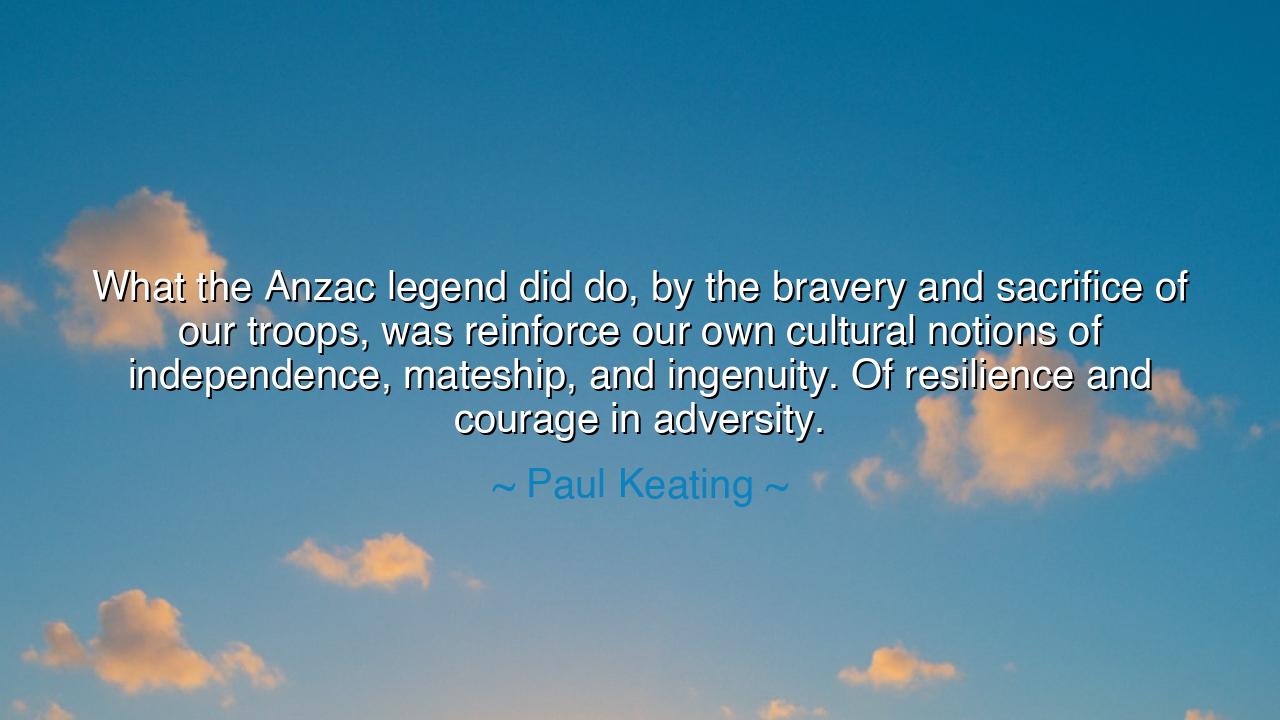
What the Anzac legend did do, by the bravery and sacrifice of our
What the Anzac legend did do, by the bravery and sacrifice of our troops, was reinforce our own cultural notions of independence, mateship, and ingenuity. Of resilience and courage in adversity.






Paul Keating, former Prime Minister of Australia, spoke words that echo not merely in the chambers of politics, but in the very heart of a nation’s soul: “What the Anzac legend did do, by the bravery and sacrifice of our troops, was reinforce our own cultural notions of independence, mateship, and ingenuity. Of resilience and courage in adversity.” These words are both remembrance and revelation — a tribute to the fallen and a reminder to the living. In them, Keating captures the essence of what it means to be Australian, but beyond that, what it means to be human in the face of great trial. The Anzac legend, born in the blood-soaked sands of Gallipoli, became not a tale of victory, but of valor, endurance, and brotherhood.
In the dawn of April 25, 1915, when the Anzacs landed on the rugged shores of Gallipoli, they faced not triumph, but chaos. The cliffs rose steeply above them, the enemy was entrenched, and the sea behind offered no retreat. Yet in that crucible of suffering, something immortal was forged — a spirit that refused to yield. Though the campaign itself was doomed to fail, the character it revealed would outlive the battle. It was there, amid the thunder of guns and the cries of the wounded, that mateship — the sacred bond between soldiers — became a national creed. Each man fought not for glory or conquest, but for the comrade beside him. In that selfless unity, independence found its noblest form.
Keating, in his reflection, understood that the Anzac legend was not about war, but about identity. It was a mirror in which a young nation first saw its own face — not as a colony of empire, but as a people of strength, compassion, and ingenuity. The soldiers of Gallipoli and later of the Western Front did not wait for orders from afar; they adapted, improvised, and endured. Their courage was not reckless; it was steady and stubborn. Their humor, even in despair, became a weapon against fear. This combination of resilience and courage in adversity would shape not only the battlefield, but the national character itself.
Throughout history, great nations have been defined not by their victories, but by the spirit with which they endured defeat. The Spartans at Thermopylae, the Romans at Cannae, the Poles in Warsaw — all stood in moments where triumph was impossible, yet they found greatness in endurance. So it was with the Anzacs. Their legacy was not written in conquest, but in the moral strength that arises when men face destruction and choose dignity instead of despair. From their sacrifice was born a model of manhood and womanhood — not arrogant, but steadfast; not loud, but loyal; not triumphant, but true.
Even after the smoke of war had cleared, the Anzac spirit lived on in every act of service, in every neighbor who lent a hand, in every worker who toiled without complaint through drought or fire or flood. It taught generations that true independence is not isolation, but the courage to stand upright when the world bends low. It reminded them that mateship is more than friendship — it is a covenant of loyalty in times of hardship. It showed that ingenuity is not born of luxury, but of necessity — the art of doing much with little, of finding a way when there seems none.
Paul Keating’s words remind us that these qualities are not relics of history, but living virtues. In a world that grows ever more divided and self-absorbed, the Anzac legacy calls us back to the values of unity, resilience, and courage. It urges us to face modern trials — not with bitterness or fear, but with that same quiet strength that once held a trench, a ridge, a dream of freedom. For courage is not only for soldiers; it is for every man or woman who stands up for what is right, who bears burdens with grace, who helps another when it is easier to turn away.
So, my listener, take this lesson to heart: the Anzac legend is not only a story of the past — it is a torch for the future. When life confronts you with hardship, stand firm. When others falter, offer your hand. When the world demands ease, choose integrity. Be resilient in adversity, brave in uncertainty, loyal in friendship, and resourceful in struggle. For these are not merely national virtues — they are eternal ones. And as long as they live in the hearts of the living, the legend of the Anzacs, and all they stood for, shall never fade.






AAdministratorAdministrator
Welcome, honored guests. Please leave a comment, we will respond soon